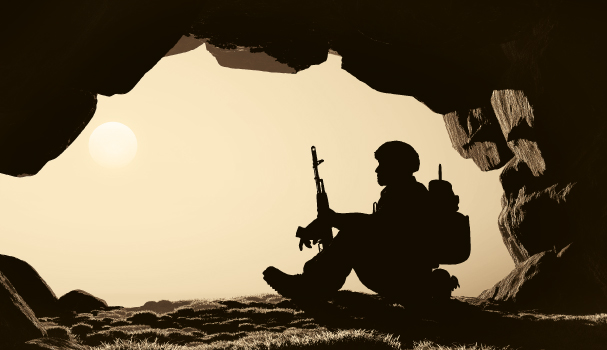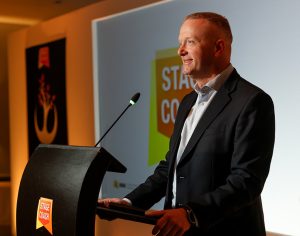The training that the forces personnel receive is second to none and their unique skills can be transferable across all industries. Each individual is highly trained to be disciplined, determined and able to work under extreme pressure. This training extends beyond life in the Army, Navy or Air Force; service personnel become equipped with valuable training that they can utilise in all walks of business.”
One option that is well suited to ex-forces members returning to civilian life is franchising. Buying into a franchise gives individuals a tried and tested model that lets them be responsible for their own business. For ex-forces who received a steady income for years, integrating back into society can be daunting if their career and income is uncertain. A franchised business is a proven success and more often than not a safe bet for individuals looking to be their own boss.”
Just like starting any business, launching a franchise takes determination and the belief that success is achievable. In the forces, individuals are trained to be driven and goal-oriented and the structure of the forces can be applicable to franchising as the support network in the forces is similar to that between franchisors and franchisees.
Attention to detail
Andy Darby, franchisee of ChipsAway car centre in Huntingdon, was at a career crossroads upon leaving the Royal Engineers after 11 years. He served as a combat engineer in various different roles throughout his career, stationed mainly in Germany, with time served in Bosnia. Darby had the challenge of deciding his career all over again; a tough prospect for many but especially so for ex-forces personnel who have lived a very different way of life to civilians. “I joined as a boy soldier straight from school so I didn’t really know anything else other than soldiering,” Darby explains. He started looking at his options whilst utilising the resettlement courses that the army offered. “I really fancied working for myself and I went to one of the franchise exhibitions in Birmingham and it just made sense,” he said. “It was something that somebody else had done and I could follow suit.” He’d always enjoyed working with cars so it was a natural progression to tailor his career to his passion with ChipsAway.
As his military experience and training has helped progress his career, ChipsAway was a perfect fit for Darby. He has excelled as a franchisee and is one of the few ChipsAway franchisees with a car centre. He will celebrate his 15th anniversary with the company next month. “Being an engineer, I was used to working with my hands, working hard, long hours outside and you need to be able to do that with ChipsAway.” Darby values the ability to master new skills and attributes this to his time with the Royal Engineers. His determination and dedication led him to buy out his local accident repair centre so that he could complete bigger jobs rather than wave goodbye to money he was losing by recommending the local repair centre.
Driving force
After 28 years of service in the Princess of Wales’s Royal Regiment, Steve Gaskell had worked his way up the ranks and finished his army career as a captain. Gaskell was stationed in Cyprus, Northern Ireland, Iraq, Afghanistan and Bosnia amongst other countries, often working under extreme pressure in harsh environments. Whilst in the latter part of his army career he began to develop his skills ready to transition back into civvy street.
“He studied for a degree in leadership and management at Northumbria University sponsored by the Army. For most students, the dreaded dissertation means many all-nighters but Gaskell faced unusual difficulties. “Trying to write a dissertation in Afghanistan or finish off an assignment in Iraq was a challenge.” He then started to get involved with coaching in the Army and after years of working away from his family, Gaskell began to explore his career options. “Family had come second and I wanted to adjust that so I started thinking about what I could do when I leave. You start to look around at the opportunities out there and I found coaching was quite a good niche for me. I thoroughly enjoyed it.” When reading Quest, a magazine for returning armed forces, Gaskell came across an advert for ActionCOACH, which led him to ExCeL in London for the Franchise Show. “I had a conversation with the team on that particular day, which led me to think about buying a franchise and to ask myself, ‘am I the right person for them?’ and, ‘is it the right business for me?’ Very soon I realised that ActionCOACH, in many similar respects to my military career, offered a great community and it was a no-brainer,” Gaskell says. He feels that he was able to utilise all of his transferable skills and leverage his passion for coaching.
“As a business coach I haven’t come across a challenge where I haven’t been able to relate it to my military history and my military experience,” Gaskell says. He left the Army in 2013 and in November 2013 he launched his ActionCOACH franchise – and has not looked back. “Since November I have had a great journey; I have absolutely prepared myself for the transition and I have been able to utilise all of my transferable skills.””
The systemisation and support network within franchising is very similar to the forces; it’s a tried and tested model for personnel to free themselves from the instructions of others and be their own boss.”

Jade Saunders
Saunders recently graduated with a degree in Journalism after three years of sun, sea and cider living in Cornwall. After being pried away from the pasties, she returned home to join the team at Elite Franchise combining her passion for entrepreneurship and her love of writing. Saunders busies herself co-owning a clothing company, Undead Glory, and has her hands full with her french bulldog puppy and partner in crime, Herbie.

Jade Saunders
Saunders recently graduated with a degree in Journalism after three years of sun, sea and cider living in Cornwall. After being pried away from the pasties, she returned home to join the team at Elite Franchise combining her passion for entrepreneurship and her love of writing. Saunders busies herself co-owning a clothing company, Undead Glory, and has her hands full with her french bulldog puppy and partner in crime, Herbie.
































